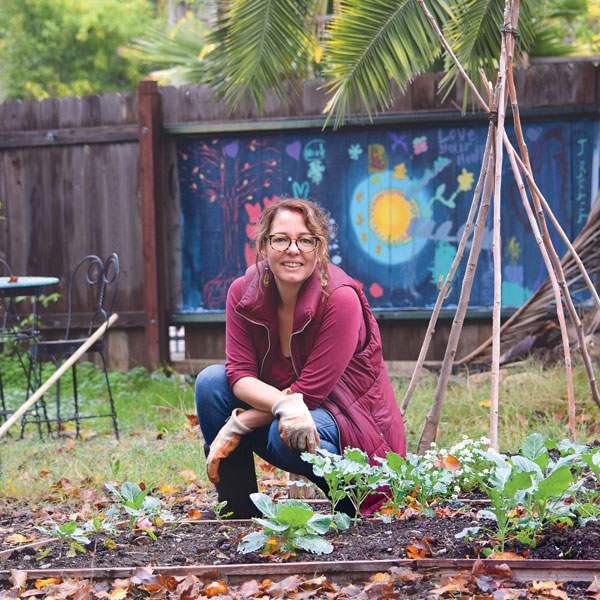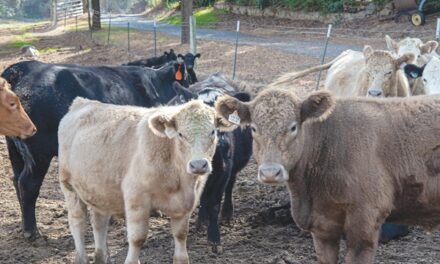Soil for the Soul
Interactive garden promotes personal, spiritual and physical growth
By Tessa Marguerite Outland
January 2020
The micro-grants, typically $300 to $700, provide critical one-time funds to promote nutrition, health, a healthy environment and the cooperative movement.
Shakti Rising, a nonprofit helping women with histories of addiction, abuse, depression and self-destructive behaviors, launched its Sacramento location in 2018 at a charming Victorian house called Casa Luna Y Lobos. The holistic organization aims to empower women by cultivating foundational skills for emotional well-being, personal health, leadership, meditation, nutrition and gardening.

With the funds from the micro-grant, Shakti Rising created an educational and interactive garden to serve women in the recovery program. The purpose of the garden is to increase access to nutritional food though an edible and medicinal garden that is advantageous physically, metaphorically and spiritually.
When Hensley and other leaders at Shakti Rising got the news that they would receive the grant, Hensley says they were immediately excited and believed it would be an investment in the community. With the introduction of the garden, the organization can continue its growth in creating community spaces that are safe, healthy, vibrant, diverse, sustainable and culturally alive.
In the center of the garden is a circle of chairs around a table, inviting friends to gather and share the space together. Several chickens ramble about the greenery and a pond stimulates a quiet calm. “We really think about the garden and the space here as a living classroom where we can explore,” Hensley says.
There is a hand-painted sign that reads “Food Forest,” and a mural painted with vibrant colors along a wooden fence listing the “Permaculture Principles.” Permaculture is a way of working with the earth that is physically sustainable. The first principle is “observe and interact.”
“Before we ever do something in the garden, we take time to notice what’s happening back there—the sun, the creatures—and also how to do this in our lives with new situations,” Hensley says. Other principles include “catch and store energy” and “produce no waste.”
Metaphorically, working in the garden can “unearth” problematic personal issues. Hensley says the metaphor of the garden helps the apprentices (women in the transformational recovery program) have a healthy relationship with food and the earth. “Getting in the garden is one of the biggest impacts in someone’s mental health,” Hensley says. “Not just physically being in the garden, but growing your own food. Some of the ladies that have eating disorders discover that working in the garden brings their relationship with food to a totally different place.”
In early recovery, Hensley says many of the young women have “untended” grief, anger or neglect. Toiling in the garden among the amaranth, basil and squash may prompt thoughtful questions. “What am I weeding out of my life?” “How can I nourish this soil?” “What garbage can I put to good use as compost?”
Prior to joining Shakti Rising in March 2018, Kaitlyn Devereaux said she struggled with depression and low self-esteem. “I felt like I didn’t have a place or purpose in the world,” she says. “Shakti didn’t give me purpose, but it showed me I always had one. It really saved my life.”
Devereaux says before Shakti Rising she had never gardened, and at first it was intimidating to get her hands dirty and make things grow. But soon it became a sacred place for personal as well as agricultural growth. “The garden is where we take all of our stuff, our problems,” Devereaux says. “Any of our stressors, any heavy energy, we go out there and we work with the garden and it’s like a cleansing. It remediates it into healing.”
Hensley agrees that the necessity of the garden for physical, metaphorical and spiritual purposes for the women of Shakti Rising is evident. “The work we put into the garden comes back to us,” she says. “It’s directly sustaining the program.”
Join the women at Casa Luna Y Lobos for Community Garden Day on Saturday, Jan. 11, from 9:30 a.m. to 12:30 p.m. All are welcome. Shakti Rising is at 2211 O St. To attend, RSVP to sage@shaktirising.org. For more information on Shakti Rising, visit shaktirising.org/nor-cal-sacramento.
Tessa Marguerite Outland can be reached at tessa.m.outland@gmail.com. Follow us on Facebook, Twitter and Instagram: @insidesacramento.















